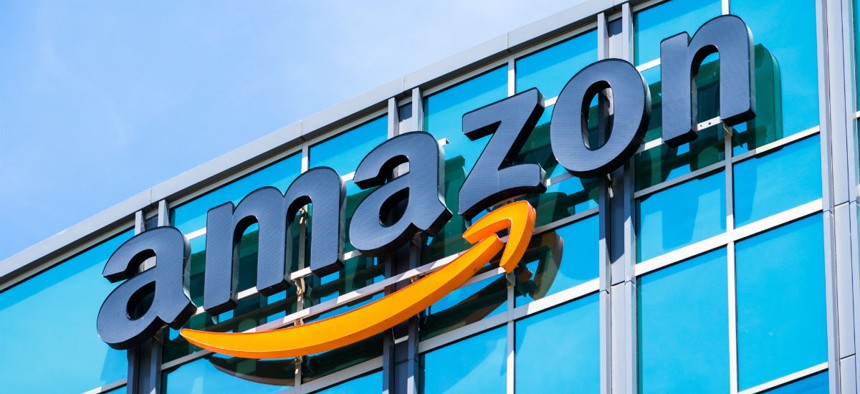
Sundry Photography/Shutterstock.com
Amazon’s Reported Move Is Bad News for Federal Hiring Managers
The competition for talent in the Washington metro area is going to get fierce.
The government’s struggle to attract talented technologists is about to get a lot harder.
The New York Times reported on Monday that Amazon has decided to split its new $5 billion headquarters between Crystal City in Arlington, Va., and New York City. The news comes more than a year after Amazon requested proposals for the new site, dubbed HQ2.
Arlington, just across the Potomac River from Washington, is dominated more by defense contractors than hackers. But thanks to the development of the Mark Center, a government facility born of the Base Realignment and Closure Commission and finished in 2013, Crystal City may have the office space for Amazon. Just two years ago, Arlington officials were worried about a nearly 20 percent vacancy rate in available office space, collateral damage inflicted by government belt tightening during the sequestration years that led a number of military and defense clients to vacate their offices.
While the area may have available office space, there is one thing it doesn’t have in abundant supply—talent. There is demand for tech talent across the country, but the tech skills talent shortage is even greater in the Washington metro area. The LinkedIn Workforce Report shows a 212,838 person shortage of software engineers in Washington. Why such a skills shortage in the nation’s capital? Just like every other region, everyone needs tech talent. In Washington, you have not just the demand for health, finance, and commercial tech, you also need skilled professionals to keep the defense industry and Intelligence Community in business.
The Tech Talent Shortage
What effect will the Amazon headquarters have on Northern Virginia‘s tech community? The competition for cleared talent will grow even greater, and some issues, like higher rents and hellish commutes, could drive more defense professionals away from the area. (Traffic rants continued for years after the construction of the Mark Center, which housed just 6,500 people.)
“It is much more economical to bring in the resident workforce (no relocation costs) than to import workers to the D.C. area,” said Christopher Burgess, a security professional, CIA veteran and regular ClearanceJobs contributor. “The beltway defense and intelligence contractors can expect pressure to be put on their executive workforce. If employers haven’t shown their cleared executives the love they deserve, there will be opportunities on the horizon when Amazon arrives. The cascade effect will be interesting to watch, as poaching creates vacancies, which creates requirements to fill, so I would expect a bit of lateral churn to also occur.”
College students majoring in engineering select Amazon as a top 10 employer. Computer science majors rank the company in the top three. Defense employers also rank, but they generally can’t compete with the major Silicon Valley companies for salaries and stock options. The current shortage of workers with security clearances is exacerbated by the one- to two-year wait for new clearance determinations. But the strength of the commercial sector has also been a factor. Just a few years ago the defense budget was plummeting, Lowest-Cost, Technically-Acceptable contracts were the norm, and salaries were stagnant. While defense budgets are growing and salaries are rising, the defense industry is still rebounding.
Today’s security clearance backlog is down from a high of roughly 750,000, but it still sits at more than 600,000. While the Office of the Director for National Intelligence has plans to reduce the backlog by half in the next six months, it’s unclear how exactly they plan to do that. Even if the backlog continues to fall, the defense industry is still years away from recovering from the effect of thousands of vacancies and hiring delays at agencies like Homeland Security and Defense.
Silicon Valley v. Defense: It’s Complicated
Amazon will likely add to the current hiring trend of poaching for great technical talent, and it will be able to offer both competitive salaries and stock options, a benefit rare among federal contractors and not available to government employees. And commercial sector positions won’t face the issues of continuous evaluation or government data breaches.
Yet another problem is the ongoing moral dilemma many tech professionals feel about working for the defense industry. In recent years, employees have pressured tech giants, including Google, from working with the federal government. If given the choice between a government position offering half the salary and a two-year wait, many tech pros will choose the commercial sector.
In the short-term, Amazon’s workforce demands will mean more pressure and scarcity. But some are optimistic that the influx of resources and attention will spur area universities into action to help train and grow the local talent needed to fill the thousands of new tech jobs.
“Amazon’s workforce needs will make our present skilled workforce shortage even more acute but it also will spur more state, regional and local investment in the workforce arena and amplify the numerous workforce initiatives taking place at George Mason University, Northern Virginia Community College, the Commonwealth Cyber Initiative administered by Virginia Tech, programs at University of Virginia and at other educational institutions throughout the state, as well as innovative apprenticeship programs,” notes Bobbie Kilberg, president and CEO of the Northern Virginia Technology Council. “Bottom line: over time, our region will benefit from Amazon’s HQ2 and our workforce will grow to meet the demand.”
The question is how long will it take for the region to build that capacity? And more acutely, how will the government compete for talent? For a defense workforce already facing massive pressure and personnel shortages, the instant need for 25,000 new employees in the shadow of the nation’s capital means major pressure on the defense workforce and federal government hiring managers.
Lindy Kyzer is the editor of ClearanceJobs.com and a former Defense Department employee.
Image via Sundry Photography/Shutterstock.com.






